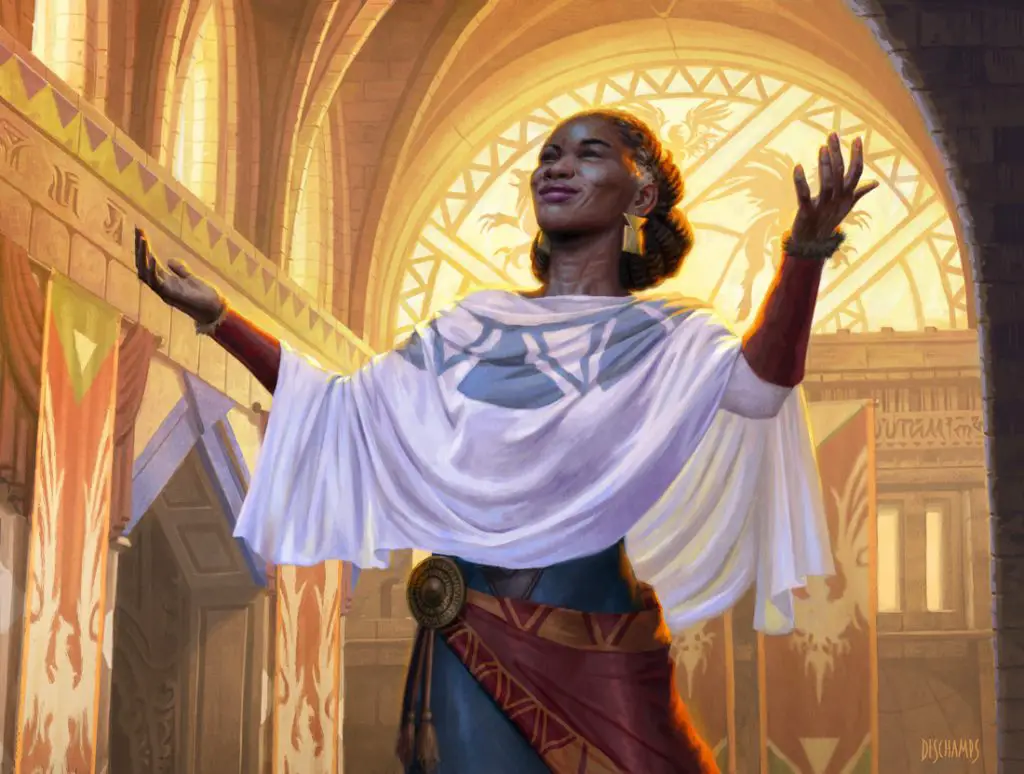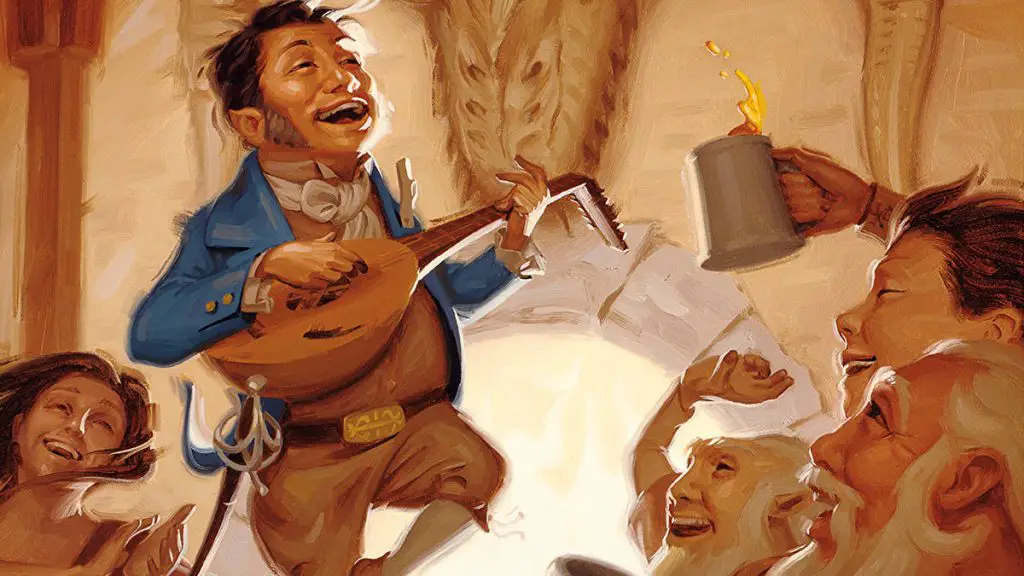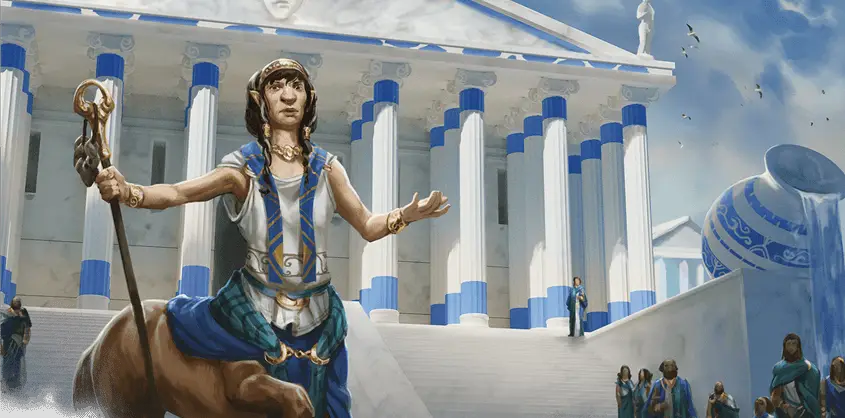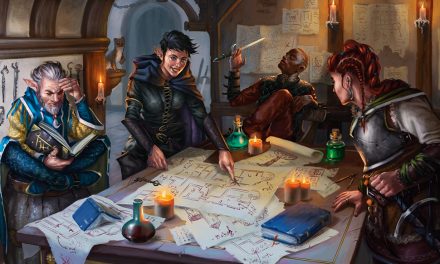The College of Eloquence Bard is different from most other bards in that they prize logic and speaking ability above otherwise charming pleasantries.
Don’t get me wrong! These bards certainly have their charms! In fact, it’s unlikely you will ever fail a Charisma check again!
How’s that for eloquence?
Wielding your wit, prose, and simply unmatched way with words like the sharpest sword, the College of Eloquence bard stands apart from others as what is possibly the greatest face in Dungeons & Dragons 5th edition.
Today we are covering everything you need to know about the College of Eloquence Bard in D&D 5th edition.
What is the College of Eloquence Bard in D&D 5e?
As a College of Eloquence Bard, you’re generally less focused on the stirring musical performances that are so typical of most other Bard subclasses.
Instead, you are a gifted speaker and debater. You have a strong grasp on the importance of rhetoric, unparalleled wordplay talent, and a refined ability to capture the attention of those who hear you speak.
You might be someone with a political background or ambitions who uses their words to champion their causes. On the other hand, you might be a gifted actor whose powerfully dramatic charisma goes beyond the stage.
However you apply the skills of the College of Eloquence, one thing is certain: you know exactly how to use your words to affect and move others!
The College of Eloquence Bard was first published in The Mythic Odysseys of Theros. From there, it was later included as one of two Bard subclasses in Tasha’s Cauldron of Everything (with the other being the College of Creation.)
Role in the Party
As a College of Eloquence Bard, you are a very powerful support character for your party. Particularly with your speaking abilities, you will likely be handling most if not all of the interactions with NPCs that your party has.
However, your abilities are not limited strictly to role-playing. As it just so happens you can be just as formidable in combat as out of it.
In particular, your options for using your Bardic Inspiration dice are some of the best available to any Bard.
Almost immediately upon becoming a College of Eloquence Bard, you are not just a world-class speaker and formidable debater, but you are an indispensable part of any party’s strategy.
If you choose to tell the truth, you are a remarkably persuasive person who is able to speak to both the minds and hearts of those who listen to you.
Should you choose to be more deceptive, however, the same people will likely believe you all the same.

College of Eloquence Bard Abilities
While most of the Bard subclasses play to the “support” role, few do so as much as the College of Eloquence.
With clever use of spells, class features, and your Bardic Inspiration, you motivate your allies to glory. You can quickly build a great rapport with influential NPCs just as surely as you can disassemble arguments made against you and your friends.
Silver Tongue (Level 3)
When you take the College of Eloquence subclass at level 3, you gain two features. The first of these is Silver Tongue and it’s incredible.
In fact, it’s so incredible that it’s a little difficult to believe that this is the first subclass feature you get!
When you make a Charisma (Persuasion) or Charisma (Deception) check, you can treat a roll of 9 or lower as a 10.
Say what?!?!
In all but the most extreme situations, you’ll likely never fail an attempt to persuade or deceive others again.
At level 3, let’s say that you have a Charisma score of 18 which gives you a +4 modifier. You’ve (rightly) taken proficiency in Persuasion and Deception. Your level 3 Bard Feature, Expertise, doubles your proficiency bonus in these skills from +2 to +4.
So…
At level 3, you’re already rolling these checks with a +8. Thanks to Silver Tongue, you can’t roll less than a 10 which means the lowest you can get on these checks is an 18.
And that’s just at level 3 assuming you roll a 10 or less…
If there were any doubts that you’re the party’s “face” before now, this should squash those.
Unsettling Words (Level 3)
Your second level 3 feature is Unsettling Words. This gives you a nice, aggressive way to use your Bardic Inspiration.
As a bonus action, expend one use of your Bardic Inspiration and choose one creature you can see within 60 feet of you. Roll the Bardic Inspiration die.
The creature must subtract the number rolled from the next saving throw it makes before the start of your next turn.
Tons of spells have pretty stiff penalties if a creature doesn’t pass the saving throw. As it just so happens, many of these spells are on the Bard’s spell list!
By reducing a target’s saving throw, you can potentially disrupt the entire combat. Casting spells like Hypnotic Pattern, the classic Suggestion spell, or Dominate Person can quickly make or break an entire fight.
If there’s a target that you absolutely need to remove from the fight, this can greatly help you.
Of course, this also lends itself to some awesome combos with the other casters in your party.
A Demon that’s giving your party trouble is now even more likely to fail its save against your Cleric’s Banishment spell.
Need to bring the notoriously slippery Bandit Leader in alive? Helping your Wizard Polymorph him into a turtle can make quick work of the matter!
While the amount reduced does depend on what you roll on the Bardic Inspiration die, even a -1 to a save can make all the difference!
Related: Full Guide To Using Bardic Inspiration in D&D 5e
Unfailing Inspiration (Level 6)
What’s better than having Bardic Inspiration?
Having Bardic Inspiration with some insurance, of course!
When a creature adds one of your Bardic Inspiration dice to its ability check, attack roll, or saving throw and the roll fails, the creature can keep the Bardic Inspiration die.
This feature is simply incredible. If your ally uses the Bardic Inspiration die that you gave them and still manages to fail at whatever they’re rolling, they don’t lose the Bardic Inspiration die and are able to use it again later.
Being able to get this much extra use out of every single use of your Bardic Inspiration is wickedly good.
Because the die lasts for 10 minutes, you know that it’s going to make a difference at some point even if your ally has had “one of those days” where they just don’t seem to roll particularly well. (Let’s be real, it happens to all of us!)
Furthermore, at this point, your Bard is getting all of their Bardic Inspiration charges back on a short rest. Considering your uses of Bardic Inspiration are “common as candy” now and only get used if the roll in question succeeds, this is giving you and your allies maximum value from your main ability.
It’s really difficult to express just how massive this is. Even if the College of Eloquence Bard’s other abilities were pretty “meh” this would still make them a great subclass option!
But since that’s not the case and everything has been really awesome so far, it’s yet more awesomeness being added to the College of Eloquence subclass.

Universal Speech (Level 6)
As a College of Eloquence Bard, you actually get some extra love at level 6.
For all of your mastery of speech, wordcraft, and rhetoric, what a shame if your audience just simply doesn’t understand your language!
But those days are long gone, dear Bard! Now, you can easily communicate with anyone!
As an action, choose one or more creatures within 60 feet of you, up to a number equal to your Charisma modifier (minimum of one creature.) The chosen creatures can magically understand you, regardless of the language you speak, for 1 hour.
Once you use this feature, you can’t use it again until you finish a long rest, unless you expend a spell slot of any level to use it again.
There’s a bit to dissect here…
First, this is definitely a powerful ability in the right situation. However, you have to take note that this communication is one-way. They can magically understand you, but you can’t understand them back without the use of something like Comprehend Languages.
Secondly, your allies won’t be understood by the creatures you target. You can certainly translate for your friends though, if necessary.
But the most interesting part of this feature is that the creatures you target don’t necessarily have to have a language to understand you. Reasonably, as long as the creature has some kind of Intelligence you can communicate with it.
This means that you could likely attempt to parley with an Umber Hulk, group of Trolls, or some other such threat just as well as you could with a group of Bandits.
Also Check Out: The Best Bard Spells By Level in D&D 5e!
Infectious Inspiration (Level 14)
Remember how I said that the only thing better than Bardic Inspiration is having insurance on it?
Well, it just got even better if you can believe that!
When a creature within 60 feet of you adds one of your Bardic Inspiration dice to its ability check, attack roll, or saving throw and the roll succeeds, you can use your reaction to encourage a different creature (other than yourself) that can hear you within 60 feet of you, giving it a Bardic Inspiration die without expending any of your Bardic Inspiration uses.
You can use this reaction a number of times equal to your Charisma modifier (minimum of once), and you regain all expended uses when you finish a long rest.
So basically, your ally has your Bardic Inspiration until they succeed. Once they succeed, you kind of get to say “I told you so” to another ally and give them a free Bardic Inspiration. You can do this five times a day!
Honestly, this is so powerful that it’s doubtful you’ll use your Unsettling Words feature again unless it’s a truly dire situation. Possibly worth keeping one use up your sleeve as a “just in case,” but generally you’re now the Inspiration GOAT.
The amount of mileage that you can get out of your Bardic Inspiration is now without equal. In any given situation, you should have at least one ally with a Bardic Inspiration ready to go now!
Infectious Inspiration is a powerfully amazing capstone ability for the College of Eloquence Bard subclass.
Also Check Out: Magical Secrets For Bards (Guide + Best Options!)
Connections
There are many ways to connect a College of Eloquence Bard to both the game’s world and the party.
If your Eloquence Bard is more political in nature (a noble, lawyer, or senator for example), they might be seeking to use their influence to make connections and gather allies. Not only does this tie them in with the party, but it gives the character a solid reason to be traveling on an adventure.
Maybe they’re attempting to build a resistance against some coming threat. Perhaps they have found themselves ousted from a corrupt group of wealthy elites and are attempting to reclaim their place.
On the other hand, an Eloquence Bard could instead be portrayed as a type of Shakespearian actor. This lets you easily fit the role of an Eloquence Bard while still opening up opportunities for dramatic performances.
I can certainly envision someone playing a College of Eloquence Bard in a way similar to Paul Bettany’s performance as Geoffrey Chaucer in one of my favorite movies, A Knight’s Tale. (I’ll throw a clip below. He does such a great job!)
Is the College of Eloquence Bard Good?
It’s hard to understate just how impressive the College of Eloquence Bard is.
You’re naturally an excellent “face” for the party, but your ability to buff your allies with some truly impressive Bardic Inspiration makes you more than just a smooth talker.
You’re not quite as versatile as other Bard subclasses and sit very firmly in the “support” category, but that’s hardly a bad thing.
The College of Eloquence Bard is a fantastic addition to any party. While they naturally excel in roleplaying situations, they’re still immensely useful when the talking is done.
In short, the College of Eloquence Bard is a great choice for any Bard who wants to double-down on their role as the party’s support.
Just how great is it? You can see how it stacks up against the other Bard subclasses here!
Conclusion – College of Eloquence Bard in D&D 5e Guide
With that, we come to the end of this guide to the College of Eloquence Bard in D&D 5e.
Personally, I really enjoy reading the Theros campaign setting and the College of Eloquence especially made the book stand out to me. Seeing it be republished in Tasha’s Cauldron of Everything was exciting because this is a subclass that absolutely shouldn’t be restricted to just the Theros setting.
While there are many incredible Bard subclasses in D&D 5e, the College of Eloquence Bard truly sets itself apart!
Is this a subclass that you are thinking about playing or are currently playing? Share your character concept in the comments!
Want to stay up to date with all of the latest class guides, DM tips, D&D news, and more? Sign up for my newsletter below!
You can also follow me on Facebook and Twitter.
If you found this article helpful and want to support the site, you can buy me a coffee here! (It’s not expected, but very appreciated!)
Also, don’t forget to check out my Complete Guide to the Bard Class in D&D 5e! It has everything you need to be the most unforgettable Bard your table has ever had!









